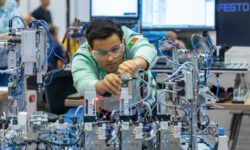How do we prepare youth with the scientific literacy necessary for the 21st century?
18 Sepember 2020

In the Spring of 1986, British astrophysicist and science writer, John R. Gribbin wrote an alarming article following extensive research for the New Scientist. One particular paragraph stood out: “By the end of the next century, the “greenhouse effect” may increase temperatures worldwide to levels that have not been reached for at least 100,000 years. And the effects on sea level and on agriculture and other human activities are likely to be so profound that we should be planning for them now”.
Gribbin was among a few scientists alerting us on climate change during an era when environmental issues were not a matter of significance. In those days, the topic of ecological sustainability was too complicated for the average person to comprehend. Policy-makers and educational institutions hardly paid attention to the potential threat of global warming.
Fast forward to 2020, the subjects of the environment and sustainability remain a rarity for most of the global education system. Public schools are particularly affected by the sluggish update of current curriculums. Bringing education programs up to date with the three pillars of sustainability – economic, environmental and social has proven to be unnecessarily challenging.
As a child during the 80s and 90s, watching the news headline with my Nigerian parents, I was attuned to the tragic consequences of Chernobyl and numerous oil spills, notably the pollution caused by Shell Oil Co in Ogoni. Like many other youths, I lacked a proper understanding of our future’s most pressing climate issues.
How do we teach the youth to sustain and protect our ecosystem with a curriculum developed for the 20th century?
Many students have insufficient knowledge of how our daily habits and toxic pollutants impact the ecosystem. Despite numerous youth networks raising awareness and advocating environmental-focused agendas, overall, the new generation lacks the competence of creating or articulating concrete methods to preserve and sustain the ecosystem.
Teaching sustainability could tackle this knowledge gap by adopting green education into the national school curriculum. As a new multidisciplinary field, synonymous to environment or sustainability education, green education programmes equip students with the degree of scientific literacy necessary to preserve the planet.
Unfortunately, attempts to reform school curriculums have proven challenging for varied reasons, especially the lack of competence, budget and coordination between academics, policy-makers and teachers obstruct school curriculum updates. Nonetheless, some nations, particularly Nordic countries, have managed to integrate green education into their existing national curriculum by investing in developing relevant competencies and coordinating interdisciplinary stakeholder meetings.
Take Sweden for an example. Swedish schools integrate sustainability across all education levels. Higher education institutions, such as the Stockholm School of Economics, also organises specialist programmes for more senior business people.
Developing a sophisticated degree of scientific literacy for students is a prerequisite to achieving the United Nations’ proposed sustainable development goals
Conveying information about sustainability that is easily understandable for all is necessary for competence building. Together with several associations, think-tanks and international institutions, the United Nations campaign for sustainable development has transformed the complicated matter of sustainability to easily relatable milestones affecting all world citizens.
To engage in the decision-making process with private and public organisations and provide creative sustainability solutions, students – both junior and senior need to be equipped with the necessary attitudes and comprehension. As a result of organisations going green, new businesses and jobs emerge. People with green education are likely to foster global partnerships and work together in concerted efforts to save the planet.
We are responsible for increasing the new generation’s employability by ensuring that education program specialists integrate environmental sustainability and ethical principles for ecological and social change. Green education provides the degree of scientific literacy necessary for the most severe threats that humanity faces in the 21st century and beyond.
About the author
Rita Isiba is the founder of Aphropean Partners and Frontiers of Dialogue Forum in Austria. She is also an Associate Partner of Funkensprung, a chain of hubs for creativity, entrepreneurship and networking scattered across Vienna. As an engagement specialist, trainer and facilitator, she supports organisations with a need to prepare for international business development assignments with a focus on Africa and Europe. Rita Isiba resides in Vienna with her partner and daughter. She is also active on LinkedIn, where she shares her views of organisational culture and business trends impacting growth.
